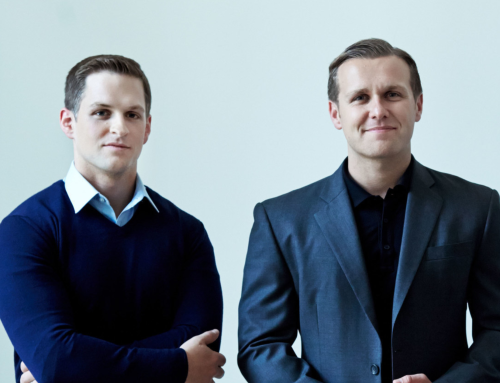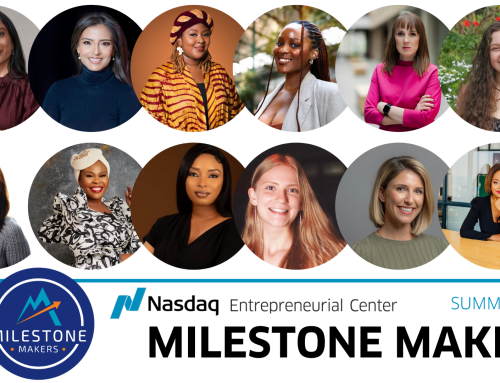Meet Tim Chen, the co-founder and CEO of NerdWallet, a company transforming the way we navigate personal finance. Launched in 2009 with a mission to bring clarity to financial decisions, Tim has grown NerdWallet from a simple idea into a trusted resource that millions turn to each month. Under his leadership, NerdWallet now operates in multiple countries, helping nearly 23 million users monthly with their financial decisions.
In our AAPI Heritage Month series with Nasdaq, Tim shares his journey from creating a simple spreadsheet for his sister to leading a company that empowers consumers worldwide. His story is a testament to the power of resilience, innovation, and a commitment to solving big problems. Join us as we celebrate Tim Chen’s contributions and insights in our Faces of Entrepreneurship interview.
And if you missed it, check out Trailblazers in Entrepreneurship: AAPI Leaders Share Their Stories – Reflect on your journey of entrepreneurial success with Sarah Lee from Glow Recipe and Charina Lumley from Movemeant Foundation in celebration of AAPI Heritage Month.
What does “entrepreneurship” mean to you?
 Tim Chen: Entrepreneurship is about finding the win-win between customers and a business. This generally requires solving a real problem that a customer doesn’t want to solve on their own. A common mistake I see with many entrepreneurs is being too short-term focused. They want to make money now rather than solve a big problem over decades. That tends to lead to solving small problems, and doing so means the mission is often less purposeful and the business is less defensible than it otherwise could be.
Tim Chen: Entrepreneurship is about finding the win-win between customers and a business. This generally requires solving a real problem that a customer doesn’t want to solve on their own. A common mistake I see with many entrepreneurs is being too short-term focused. They want to make money now rather than solve a big problem over decades. That tends to lead to solving small problems, and doing so means the mission is often less purposeful and the business is less defensible than it otherwise could be.
Another important thing for entrepreneurs to keep in mind is that how you build your company can be as important as—and have a big impact on—your product. Focus on finding, building, and iterating on the processes that increase organizational efficiency and success as you grow. Just like in nature, most systems rise because they are more efficient than competing systems. An efficient company can give more back to their customers and can pounce on opportunities during tough times.
What is your company’s origin story? What did those early days look like and teach you?
TC: The idea of NerdWallet stemmed from a conversation with my sister, who came to me with a question about finding a credit card with lower foreign transaction fees. When I began to research, I couldn’t find anything on Google that wasn’t marketing or promotional material. After a week of research compiling all of the available options, I created a spreadsheet that I shared with my sister and family, which eventually started getting passed around beyond just my own network. I realized there was a real shopability problem in financial services, because most financial guidance is provided by commissioned salespeople so it’s hard to know who you can trust. So I started NerdWallet out of my apartment with $800 to cover the website and startup fees.
Our early days were tough: In our first year we only generated $75 in revenue. But what I quickly learned was that we needed to build an organic audience, and this would drive our long-term success. Eventually, we started gaining momentum and growing our user base. Today, we operate in the U.S., UK, Canada, and Australia, we have over 700 employees, and nearly 23 million people turn to us each month for financial guidance.
What do you wish you knew when you started? Is there anything you would do differently?
TC: It’s more useful to talk about what worked than what didn’t work.
We rolled up our sleeves. When you run lean and do things, you keep agility higher and costs lower for longer. This leaves optionality for finding exactly the right specialists to plug in down the road at the exact right time, rather than having someone you thought was right for the job but no longer fits occupying the seat.
We focused on one simple goal for a very long time. That made prioritization and organizational alignment far easier. It eliminated the need for a lot of meetings and check-ins, and it made progress, or the lack of progress, impossible to miss.
What are some values from your upbringing that have had a significant impact on your approach to entrepreneurship?
TC: My parents immigrated to the US, and I learned from them the mentality of figuring it out, because nobody is going to help you when you run into obstacles. Not asking for help isn’t a good life principle, but gaining confidence in your own agency by surviving without the kindness of others for an extended period of time is a critical advantage for immigrants. As a kid, I was always coming up with these complex schemes for how to make a few extra bucks, and turn that into more money. But until I had a forcing factor—my layoff from Wall Street in 2008—I never felt like I had permission to really do it.
It was the feeling of agency I’d learned from my parents growing up that gave me the confidence and drive to build NerdWallet. I’ve carried this mindset throughout my career, and it’s proven to be one of the most important traits I could have as a leader that has directly impacted the success of the company.
Were there any barriers to entrepreneurship you faced as a minority founder? And how did you overcome those barriers?
TC: I’m a big believer that limiting beliefs are rampant and keep us from trying things that we are perfectly capable of succeeding in. We are all excluded in different ways, it’s how we show up in those situations that defines the richness of our lives. For example, I might be intimidated by certain restaurants where I don’t look like or speak the language of anyone there. But I suspect it’s delicious because I can see the food and it’s hopping. If I am too worried that I won’t communicate well and that I won’t know what to order, and decide to go somewhere familiar instead, that’d be a miss! Entrepreneurship took some guts and a willingness to be uncomfortable and curious, but doing so opened up my world.
How do you define success?
TC: If you’ve been able to define a vision for a win-win in the world, align investors and employees around it, and get those people to work together towards a common goal, that’s a strong sign of success.
When it comes to my role as Co-Founder and CEO of NerdWallet, success boils down to one thing: being able to provide consumers with the trustworthy and knowledgeable guidance they need to make financial decisions with confidence.
What is your superpower as an entrepreneur? What is your proudest and darkest moment so far? Share a key high and a key low from your journey if you can.
TC: As a CEO, I tend to maintain my equilibrium–I’m usually less pessimistic during downturns and less optimistic during good times than the average person. I’ve found this trait to be extremely helpful in the business I’m in because I can bring more objectivity to decision-making.
One of the more difficult moments for me was trying to get the company off the ground. During my first six months I spent up to 16 hours a day building an interest rate comparison product for credit unions. Once I was ready to launch it, I received feedback that this was not a product companies were going to buy or promote because they didn’t want to highlight competitors. I should have asked before I built the product. Over the years, I’ve run into a lot of humbling experiences as CEO, but they’ve all instilled in me the ability to see failure as an inevitable part of learning. And this specific moment led us to identify a true gap in the market, and begin building NerdWallet as we know it today.
My proudest moment was the first time someone thanked me in real life for the service we provide. It was a server at a restaurant, and they saw the company name on the card when I was paying. The best part was this happened while I was trying to recruit an important candidate.
What are your personal driving principles, your top values?
TC: I am constantly focused on relentless self-improvement. I’ve found it’s easier to work with leaders who want to improve themselves: They welcome feedback and are more collaborative and stronger at creating a positive team environment. I feel greater agency around creating the outcomes I want when I see failure as an inevitable part of learning, rather than a personal indictment.
Can you share some insights into the market or industry you operate in? How have you navigated challenges and changes in the market landscape?
TC: NerdWallet operates in the U.S. Financial Services Digital Advertising market—a market that’s expanding rapidly due to growing consumer demand. Meanwhile, NerdWallet’s share of that market is also expanding as we continue to meet the needs of consumers who are making decisions about their money.
It’s no secret the macroeconomic environment continues to have headwinds, but our business is cyclical, and our priority is growing from cycle to cycle. At NerdWallet, we’re staying focused on relentlessly improving to achieve our long-term goals.
 Do you have a favorite quote, mantra, or words of wisdom to get through the tough days?
Do you have a favorite quote, mantra, or words of wisdom to get through the tough days?
TC: Jeff Bezos was once quoted saying very few decisions are irreversible. That has stuck with me through my time as a CEO. There are times when you have to move ahead and make the decision you think is right at that moment—if it doesn’t work, it doesn’t work. The quote is:
“Some decisions are consequential and irreversible, or nearly irreversible—one-way doors—and these decisions must be made methodically, carefully, slowly, with great deliberation and consultation. If you walk through and don’t like what you see on the other side, you can’t get back to where you were before. We can call these Type 1 decisions.
But most decisions aren’t like that—they are changeable, reversible—they’re two-way doors. If you’ve made a sub-optimal Type 2 decision, you don’t have to live with the consequences for that long. You can reopen the door and go back through. Type 2 decisions can and should be made quickly by high judgment individuals or small groups.”
How do you think about helping others through your work?
TC: Our vision is a world where everyone makes financial decisions with confidence, but we know not everyone has access to the proper tools and resources to make these decisions. Even when they do, those decisions can cause feelings of stress and apprehension. So our job is to help cut through jargon for consumers so they can make smart money moves.
In order to further help consumers, we created a Corporate Social Responsibility (CSR) program that supports those traditionally locked out of the financial system. Millions of Americans are unbanked or underbanked. They lack access to credit and other financial products that some of us take for granted. Through our CSR initiative, we’re striving to make a tangible difference in these underserved communities.
Specifically, with the launch of our Financial Equity Pledge, we’ve been able to funnel funds to Community Development Credit Unions (CDCUs) and Minority Deposit Institutions (MDIs). We’ve partnered with Inclusiv, a nonprofit representing CDCUs and MDIs in low-income communities, and are conducting ongoing outreach to other companies to get them involved.
Last year, NerdWallet’s $2 million balance with Self-Help Federal Credit Union helped fund four commercial loans, 270 consumer loans and nine home loans, primarily benefiting people of color and those located in low-income communities.
What kind of an entrepreneur do you want to be known as – as in, what do you want your legacy to be?
TC: I hope to be known as someone who positively impacted the financial lives of consumers, and helped people gain the clarity needed to make all of their financial decisions.
Do you have someone you’d like to nominate to be profiled in our Faces of Entrepreneurship series? Please let us know by emailing media@thecenter.nasdaq.org or submitting your nomination using this form.




Invite a Friend
Close